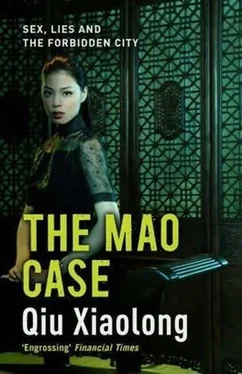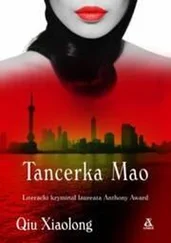It wasn’t the time for a trip to Beijing, even for all the suggestions Yong would offer him Ling’s honeymoon was barely over – whatever problem she might have at the moment, it wasn’t up to him to interfere.
He finished his cigarette before getting up. Still groggy from the shattered dream, he went to the sink and brushed his teeth vigorously, the image of the gray gargoyle fading, yet a bitter taste lingering in the mouth.
There wasn’t much left in the small refrigerator. A leftover box of roast duck from about a week earlier and half a leftover box of barbeque pork from god-knows-when – both from meals with business associates – and a bowl of cold rice as hard as a rock. He was in no mood to have his breakfast out. In the last two weeks, he had already spent his monthly salary and had to dig into his savings again. He could have some of the recent expense reimbursed in the name of his special assignment, but he wasn’t sure how the Mao Case would end up, and he didn’t want to submit a staggering bill for nothing. He decided to make himself a chop suey with all the leftovers boiled in a pot of hot water, along with the remaining scallion and ginger and dried pepper from the refrigerator. On an impulse, he took out the small bottle of fermented tofu and threw in the last piece along with the multicolored liquid.
As the pot was boiling on the gas head, Song called.
“I’ve talked to Gao Dongdi, a lawyer for whom Yang had once worked, as well as some other people close to Yang…”
To be fair, Chen admitted to himself that Song, though pushing for the “tough measure,” had lost no time checking into other aspects of the murder.
Chen listened, lighting another cigarette. If Xie was not the criminal, there was a murderer at large, responsible for Yang’s death and for planting her body in the garden. It might not necessarily be part of the Mao Case, but it was nonetheless a case for him.
“People go to Xie Mansion for their own reasons,” Song went on. “Some may go for a sense of elite social status, but others, for something real or practical. For instance, in the case of Yang, who had something of her own business network, it was for connections. She was also in the business of making herself irresistible to Big Bucks, and possibly she had something more substantial in mind – the mansion itself. Xie is in his sixties. Divorced. No heir.”
“So that’s a possible motive for murder -” Chen said, “at least for those young rivals who’re close to Xie.”
“But in that scenario,” Song said, contradicting himself, “Yang’s body would have appeared anywhere but in Xie’s garden.”
Besides, Yang hadn’t been close to Xie, as Chen had noticed. She wasn’t a likely threat to a rival.
As for someone really close to Xie, it would have to be Jiao. Her consideration for Xie had gone further than Chen had expected, not to mention the alibi she had provided for him. Still, Chen couldn’t bring himself to conceive of Jiao as a materialistic girl with such a motive. It didn’t fit what he knew of her.
But for once, Song and Chen seemed to be converging on the same point the possible relation between Xie and Jiao.
After finishing the phone conversation, Chen lost himself in thought for several minutes before he found the chop suey badly burnt on the gas head. He moved to stand by the window, lighting a third cigarette that morning, staring out at the new high-rises that had been popping up around the city like bamboo shoots after a spring rain. His left eyelid started twitching. An ominous sign, according to the folk superstition Old Hunter believed in. Chen frowned, trying to find a strong tea that might suit his mood.
Searching the drawer again, he saw only a tiny bottle of gin. Possibly a souvenir from an airplane trip. How it could show up this morning, like the gargoyle in the dream, he was confounded. The bottle was tiny, smaller than the “small firecracker” he had seen in Gang’s hand the day when he first got the assignment.
A plan for the morning came to mind, abruptly.
He was going to the eatery near his mother’s place. Gang had said that he would be sitting there, from morning until evening. It was a long shot, but Chen wanted to give it a try. A breakfast there wouldn’t be expensive at all. And he might drop in at his mother’s place for a short visit afterward.
At the eatery entrance, Auntie Yao was selling warm rice balls stuffed with fresh fried dough stick to the customers that stood waiting in line, yawning or eye-rubbing. She appeared astonished at Chen’s arrival that morning, looking over her shoulder while wrapping the sticky balls in her hands. Chen saw Gang sitting at a table inside by himself.
“Oh, Little Chen. You’re quite early today,” Gang said.
“This morning I found this bottle of gin by chance, so I thought of you.”
“When you hear the battle drums and gongs, you think of a general. You are something of a gentleman from ancient times.”
Gang had only a cup of cold water on the wine-stained table. No rice ball or fried dough stick. No liquor, either. He was sitting there perhaps because it was like a home to him.
“It’s too early for me,” Gang said, taking the tiny bottle. “Two bowls of spicy beef noodles, Auntie Yao,” Chen gave his order. “The foreign stuff may be too much for breakfast.” Gang studied the bottle of gin closely, turning it over in his hand.
“You’re right.” Chen said loudly to Auntie Yao again, “And a bottle of Shaoxing rice wine too.”
“You have not come here for noodles, I believe,” Gang said, a sharp light flashing in his eyes. “Let me know if there’s anything I can do for you.”
“All right, let’s get to the heart of the matter, Gang. You were a Red Guard leader at the beginning of the Cultural Revolution. I have some questions about the campaign of Sweeping Away the Four Olds. I was young then, you know. There was a lot I didn’t understand. So you may start by giving me a general background introduction on the campaign.”
“Well, Mao wanted to snatch back power from his rivals in the Party, so he mobilized young students into Red Guards as a grassroot force fighting for him. As the first campaign of the Cultural Revolution, Red Guards were called on to sweep away the Four Olds – old ideas, old culture, old customs, and old habits. So the class enemies like capitalists, landlords, well-known artists and intellectuals, all of them became easy targets. They suffered mass criticisms, and their homes were searched for ‘old stuffs,’ which were either smashed or swept away.”
“Yes, my father’s books were all burned. And my mother’s necklace was snatched off her neck.”
“I’m sorry to hear about your family’s suffering. Mao declared ‘Sweeping Away the Four Olds’ to be revolutionary activities, and the Red Guards believed in whatever he said. We beat people, but later we ourselves were beaten too.” Gang bent to pull up the bottom of his pants. “Look, I was beaten into a cripple. Karma.”
“It was the Cultural Revolution, and you paid a price for it too. You don’t have to be too hard on yourself, Gang. But there were so many black class enemies at the time, and so many Red Guard organizations, how was the campaign conducted?”
“For each factory or school or work unit, there was a Red Guard organization or something like it, but there were also larger organizations, like mine, which consisted of Red Guards from various schools. A Sweeping Away action against a particular family usually didn’t take a large organization like ours to carry out. For instance, your father was a professor, so it should have been the Red Guard organizations of the university that raided and ransacked your house.”
With the arrival of the noodles and the rice wine, Gang stopped talking. Auntie Yao had the beef slices placed in a separate small dish instead of atop the noodles. She also gave them a dish of boiled peanuts for free.
Читать дальше












